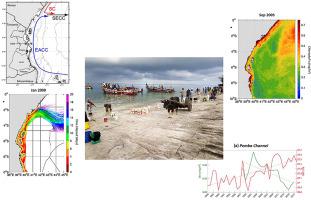当前位置:
X-MOL 学术
›
Ocean Coast Manage.
›
论文详情
Our official English website, www.x-mol.net, welcomes your feedback! (Note: you will need to create a separate account there.)
The small pelagic fishery of the Pemba Channel, Tanzania: What we know and what we need to know for management under climate change
Ocean & Coastal Management ( IF 4.6 ) Pub Date : 2020-11-01 , DOI: 10.1016/j.ocecoaman.2020.105322 Baraka Sekadende , Lucy Scott , Jim Anderson , Shankar Aswani , Julius Francis , Zoe Jacobs , Fatma Jebri , Narriman Jiddawi , Albogast T. Kamukuru , Stephen Kelly , Hellen Kizenga , Baraka Kuguru , Margareth Kyewalyanga , Margaux Noyon , Ntahondi Nyandwi , Stuart C. Painter , Matthew Palmer , Dionysios E. Raitsos , Michael Roberts , Sévrine F. Sailley , Melita Samoilys , Warwick H.H. Sauer , Salome Shayo , Yohana Shaghude , Sarah F.W. Taylor , Juliane Wihsgott , Ekaterina Popova
Ocean & Coastal Management ( IF 4.6 ) Pub Date : 2020-11-01 , DOI: 10.1016/j.ocecoaman.2020.105322 Baraka Sekadende , Lucy Scott , Jim Anderson , Shankar Aswani , Julius Francis , Zoe Jacobs , Fatma Jebri , Narriman Jiddawi , Albogast T. Kamukuru , Stephen Kelly , Hellen Kizenga , Baraka Kuguru , Margareth Kyewalyanga , Margaux Noyon , Ntahondi Nyandwi , Stuart C. Painter , Matthew Palmer , Dionysios E. Raitsos , Michael Roberts , Sévrine F. Sailley , Melita Samoilys , Warwick H.H. Sauer , Salome Shayo , Yohana Shaghude , Sarah F.W. Taylor , Juliane Wihsgott , Ekaterina Popova

|
Abstract Small pelagic fish, including anchovies, sardines and sardinellas, mackerels, capelin, hilsa, sprats and herrings, are distributed widely, from the tropics to the far north Atlantic Ocean and to the southern oceans off Chile and South Africa. They are most abundant in the highly productive major eastern boundary upwelling systems and are characterised by significant natural variations in biomass. Overall, small pelagic fisheries represent about one third of global fish landings although a large proportion of the catch is processed into animal feeds. Nonetheless, in some developing countries in addition to their economic value, small pelagic fisheries also make an important contribution to human diets and the food security of many low-income households. Such is the case for many communities in the Zanzibar Archipelago and on mainland Tanzania in the Western Indian Ocean. Of great concern in this region, as elsewhere, is the potential impact of climate change on marine and coastal ecosystems in general, and on small pelagic fisheries in particular. This paper describes data and information available on Tanzania's small pelagic fisheries, including catch and effort, management protocols and socio-economic significance. Then, incorporating the rapidly improving understanding of the region's oceanography resulting from the application of remote sensing and oceanographic modelling, the paper undertakes the most complete assessment to date of the potential impacts of climate change on the small pelagic fishery of the Pemba Channel. Pathways of climate change impact are explored and crucial knowledge gaps, both in terms of the fishery itself and the wider ecosystem, are identified in order to guide future research activities. Although we analyse small pelagics in the specific context of the Pemba Channel, the key challenges identified in the analysis are likely to be relevant to many small pelagic fisheries in coastal nations heavily dependent on living marine resources.
更新日期:2020-11-01



























 京公网安备 11010802027423号
京公网安备 11010802027423号